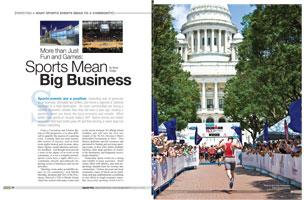
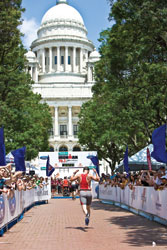 Sports events are a positive, rewarding way to generate local business, stimulate tax coffers, and shine a regional or national spotlight on a host destination. As most communities are facing a harsher economic climate than they did even a year ago, hosting a sporting event can boost the local economy and morale. What better than sports to remedy today's ills? Sports events are visible reminders that hard works pays off and that winning is never easy but always rewarding.
Sports events are a positive, rewarding way to generate local business, stimulate tax coffers, and shine a regional or national spotlight on a host destination. As most communities are facing a harsher economic climate than they did even a year ago, hosting a sporting event can boost the local economy and morale. What better than sports to remedy today's ills? Sports events are visible reminders that hard works pays off and that winning is never easy but always rewarding.
From a Convention and Visitors Bureau (CVB) perspective, it is often difficult to quantify the success of a sporting event. Certainly, there are some measurable metrics of success, such as hotel room nights booked, gate revenue, attendance figures, media attention and positive feedback. And though these provide a sense of the impact of an event on the community, it is not a complete portrait. Sports events have a ripple effect on a community, directly and indirectly impacting scores of businesses and service providers.
"Sporting events make an indelible impact on our community," said Martha Sheridan, president and CEO of the Providence Warwick CVB in Rhode Island, which has worked with major events such as the Amica Ironman 70.3 Rhode Island triathlon and will host the first two rounds of the NCAA Division I Men's Basketball Tournament in 2010. "Our Bureau dedicates specific resources and personnel to finding and servicing sporting events, as they often utilize multiple facilities, draw large numbers of visitors to the destination, and frequently receive media attention."
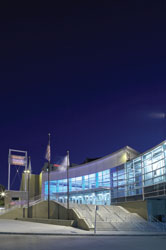 Financially, sports events are a strong and reliable revenue generator. Hotel rooms filled with athletes, fans, and media bring valuable hotel tax revenue into communities. Visitors also pour into local restaurants, many of which can be small, mom-and-pop establishments scrambling to stay afloat in tough economic times. But successful sporting events have a far reaching impact on a variety of local businesses, including laundry services, rental car companies, transportation companies, florists, local retailers, printers, and audio visual companies. Indirectly, sports events impact industries like construction, which is needed to build new hotels and facilities, or trucking, used to transport goods to hotels and athletic facilities.
Financially, sports events are a strong and reliable revenue generator. Hotel rooms filled with athletes, fans, and media bring valuable hotel tax revenue into communities. Visitors also pour into local restaurants, many of which can be small, mom-and-pop establishments scrambling to stay afloat in tough economic times. But successful sporting events have a far reaching impact on a variety of local businesses, including laundry services, rental car companies, transportation companies, florists, local retailers, printers, and audio visual companies. Indirectly, sports events impact industries like construction, which is needed to build new hotels and facilities, or trucking, used to transport goods to hotels and athletic facilities.
Some sports events include a charitable giving component. Over the course of its 11 years, Rhode Island's CVS Charity Classic golf tournament has raised more than $12 million for non-profits in New England that serve children and families. Last year alone, the foundation raised more than $1.8 million in donations. Other sport event organizers may provide in-kind gifts, such as tickets and merchandise, to children's charities.
Another benefit of hosting a sports event is that it often goes beyond convention centers and arenas, utilizing non-traditional facilities and an area's natural resources. Rhode Island is home to more than seven colleges and universities, allowing sports event planners to make use of a variety of athletic fields and facilities. The state has long been hailed as a premier seaside destination, offering ample opportunity for water-based sporting events.
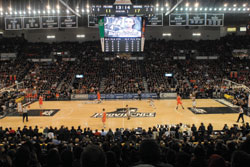 John Mathews, president of Eident Sports Marketing, was instrumental in the success of last year's Amica Ironman 70.3 Rhode Island. The triathlon took place across the state, beginning on the state's pristine beaches, racing along the state's countryside, and ending among throngs of supporters in downtown Providence. Matthews sees sports as a portal to repeat business. "I think it goes without saying that if I have a positive experience in a destination at an event, I am much more likely to return," Mathews said. "If you have a great time at an event, you will associate those positive memories with the destination."
John Mathews, president of Eident Sports Marketing, was instrumental in the success of last year's Amica Ironman 70.3 Rhode Island. The triathlon took place across the state, beginning on the state's pristine beaches, racing along the state's countryside, and ending among throngs of supporters in downtown Providence. Matthews sees sports as a portal to repeat business. "I think it goes without saying that if I have a positive experience in a destination at an event, I am much more likely to return," Mathews said. "If you have a great time at an event, you will associate those positive memories with the destination."
"I've had people come up to me after an event and say, ‘Wow. I didn't realize Providence was such a cool city.'" Mathews said. "And hopefully that becomes like that old commercial, where they tell two friends, and they tell two friends... Hopefully, by the end of an event, we have created thousands of goodwill ambassadors for the city."
The female Ironman winner, Lisa Bentley, of Toronto, raved to reporters after the race about the beauty of the state. This athlete will presumably interact with the sport's own community, detailing the race, and hopefully convincing other athletes, friends, and family members to visit the state. Bentley said she planned to return to the state and rent a beach house later in the year. This creates a sort of cyclical effect where both the event and the destination succeed.
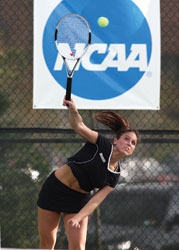 This goodwill, or positive "buzz," is certainly much harder to quantify than hard numbers. For instance, Providence will play host to the first two rounds of the NCAA Division I Men's basketball tournament in 2010. How do you quantify the impact of national commentators saying, "Live from Providence, Rhode Island..." dozens of times? Or the "beauty shots" of the city that precede national television coverage?
This goodwill, or positive "buzz," is certainly much harder to quantify than hard numbers. For instance, Providence will play host to the first two rounds of the NCAA Division I Men's basketball tournament in 2010. How do you quantify the impact of national commentators saying, "Live from Providence, Rhode Island..." dozens of times? Or the "beauty shots" of the city that precede national television coverage?
"Any time you can host a national event, it creates an impression that this place must have something special going on," Mathews said.
But it is not just national events that can make an impact. Providence Warwick Convention & Visitors Bureau (PWCVB) Director of National Accounts John Gibbons would argue that the recurring, smaller sports events can actually leave a bigger mark on the community.
"It's the stuff that nobody reads about - youth hockey tournaments, youth soccer, youth baseball - they may not be on the newspaper pages, but they're very important to the city, restaurants, hotels and store owners," said Gibbons. "Generally, the youth sports bring mom and dad, and maybe brother and sister."
"They are, literally and figuratively, a win-win for a destination," Gibbons said.
Momentum is a powerful phenomenon in sports. Sports event organizers and tourism officials both know the power of positive momentum. Successful events, media placements, and the aforementioned buzz tend to build upon one another. Events turn customers into repeat customers and positive experiences breed additional positive experiences.
 It was not long ago - 1992, in fact -- that city officials were convincing the Maine Mariners to move their franchise from Portland to downtown Providence. Three years later, the city was hosting the X-Games, garnering a new breed of exposure on national television. Soon, Providence will play host to national events such as the first and second rounds of the 2010 NCAA Division I Men's Basketball Championship, a repeat visit from the Amica Ironman 70.3 triathlon, and the Athletic National Championship cheerleading and dance series.
It was not long ago - 1992, in fact -- that city officials were convincing the Maine Mariners to move their franchise from Portland to downtown Providence. Three years later, the city was hosting the X-Games, garnering a new breed of exposure on national television. Soon, Providence will play host to national events such as the first and second rounds of the 2010 NCAA Division I Men's Basketball Championship, a repeat visit from the Amica Ironman 70.3 triathlon, and the Athletic National Championship cheerleading and dance series.
Destinations look to capitalize on these successful events and see the increased variety of events as an added bonus. It is an opportunity to promote the area to a cross-cultural, generational, and geographically diverse audience. It is also a promotional opportunity that is rarely available, especially for smaller destinations.
Additionally, destinations have the opportunity to brand themselves in regard to the sporting event. For instance, when Providence hosted the X-Games, it was an opportunity to showcase the destination as cutting edge, alternative, and exciting. For further proof, consider how many people would know Pamplona, Spain if not for their annual running of the bulls. This destination has garnered significant exposure, and presumably increased tourism business, all because of a unique, recurring sporting event.
There are also many great branding opportunities with youth sports.
John Gibbons encourages the development of recurring events as a means to generate repeat business and establish a tradition and identity for consumers, the community, and the events themselves. Recent success stories come in various shapes and sizes, but all beneficial to the host community.
The John W. Kennedy Memorial Hockey Tournament attracts youth hockey teams from across the country to fill hundreds of local hotel rooms during typically slow winter months. The Ocean State Classic soccer tournament brings soccer teams, fans, friends, and family from 18 towns throughout Rhode Island to participate. Gibbons is hoping for similar sustained growth from a forthcoming event - the New England Select Lacrosse Tournament, to be held at Bryant University in Smithfield, Rhode Island.
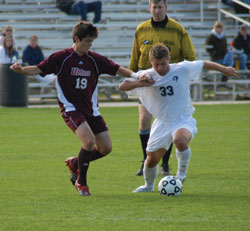 "Sports events are different from meetings and conventions for us in that they are not repeat business customers, but hopefully part of a tradition of successful, recurring events," Gibbons said. "An organization like Hoop Group (a national AAU tournament), has branded one of their events as the ‘Providence Jam Fest.' This puts the city on the tip of the tongue for their audience, the athletes, and the community."
"Sports events are different from meetings and conventions for us in that they are not repeat business customers, but hopefully part of a tradition of successful, recurring events," Gibbons said. "An organization like Hoop Group (a national AAU tournament), has branded one of their events as the ‘Providence Jam Fest.' This puts the city on the tip of the tongue for their audience, the athletes, and the community."
Often, regardless of the level or type of competition, local media tends to embrace sporting events. In fact, in a time where finding positive publicity is cause for celebration, sports are a blessing.
Sports are winners with local media. There are underdogs. Odds are overcome. There is the joy of victory, the agony of defeat, to borrow a phrase. Local media, especially now, where cost-cutting measures are routine, also latch on to the strong visuals, compelling story lines, and black-and-white results to easily churn out a positive, local story. This, too, has a positive effect community wide. Local athletes feel like champions. Spectators and sponsors see placements, lending added importance to the event.
Convention and Visitors Bureaus work hard to make the destination welcoming to sporting events, presenting flexible, customizable options to create an experience that is memorable. Sporting events are highly valued and, as demonstrated, can contribute greatly to the fabric of a destination and local business community.
Sports are captivating largely because of the unscripted ending, the unpredictability and volatile nature of the unknown. The outcome of today's financial crisis is, too, unknown. But, as they say, it is a marathon and not a sprint. Today's challenge can become tomorrow's victory. The finish line is visible. Now, more than ever, sports planning professionals need to be committed to finding destinations that work well with their product.

